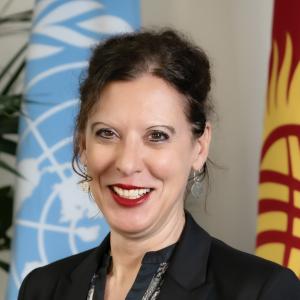Opening Statement by UNRC Antje Grawe at the Development Forum 2023: POVERTY AND INEQUALITY
Opening Statement by UNRC Antje Grawe.
Development Forum 2023: POVERTY AND INEQUALITY.
3 November 2023
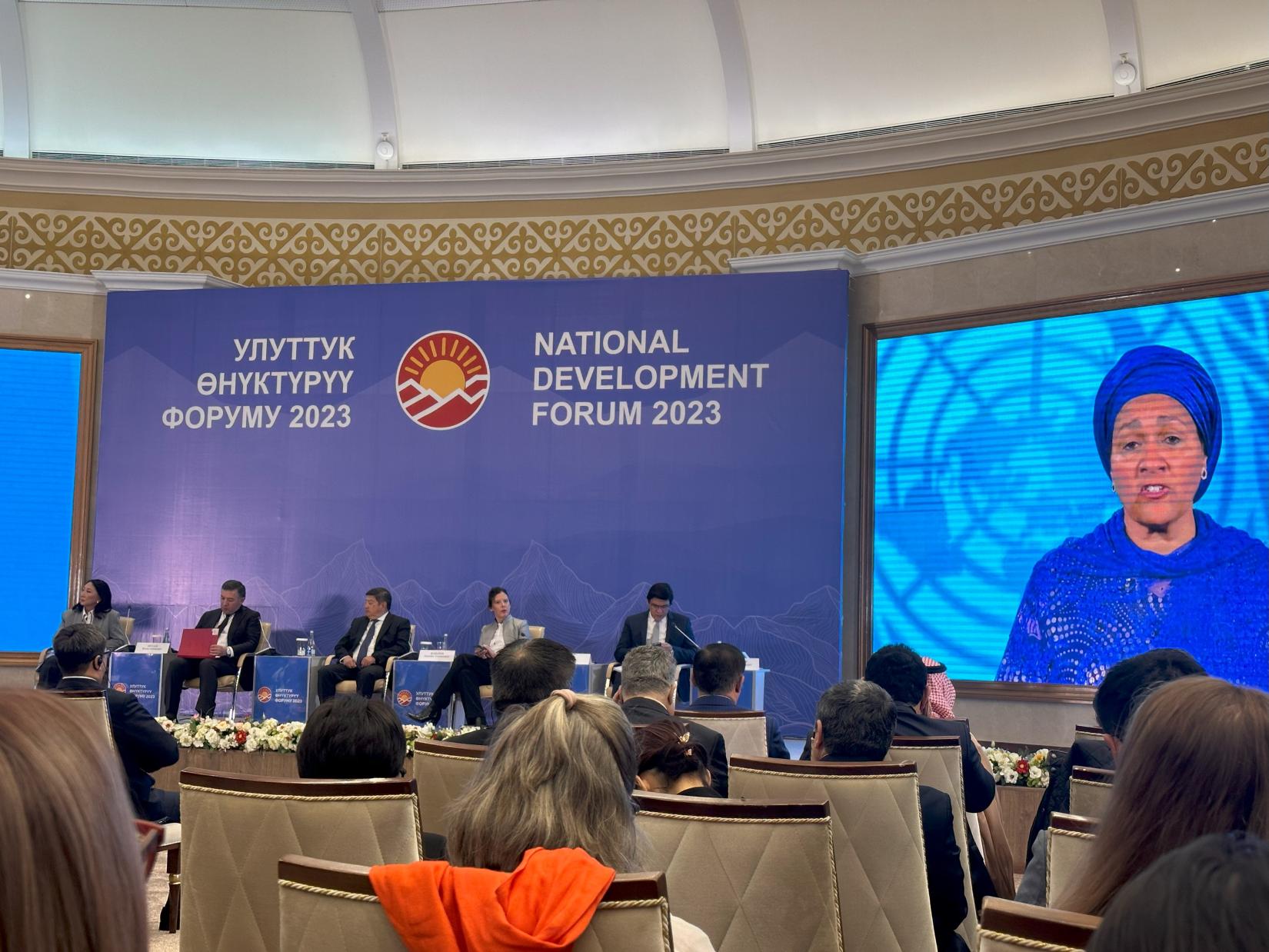
Excellency, Chairman of the Cabinet of Ministers, Mr. Akylbek Zhaparov,
Distinguished members of the Cabinet and Parliament,
Excellencies and development partners, visiting delegations,
Representatives of the civil society and the private sector,
Dear UN colleagues,
It is a true honor for me to deliver opening remarks at this Development Forum on Poverty and Inequality organized by the Presidential Administration and the Cabinet of Ministers.
Today’s Forum brings together the Government, Parliament, civil society and private sector, Kyrgyzstan’s international partners including the UN, International Financial Institutions and other bilateral and international development partners to catalyze knowledge, build on experience in Kyrgyzstan, in the regiona and elsewhere, and identify pathways towards the achievement of the Sustainable Development Goals (SDGs) in Kyrgyzstan, with a specific focus on comprehensive, inclusive, equitable and sustainable poverty reduction.
At the outset, I wish to commend the Chairman of the Cabinet of Ministers of the Kyrgyz Republic and the esteemed members of the Cabinet of Ministers for organizing this Development Forum as an immediate follow-up to the SDG Summit held in New York in September and on their choice for the theme.
I would also like to extend gratitude to my UN colleagues from the entire UN Country Team who all provided conceptual and analytical inputs as well as logistics support to the organization of the Forum, led by the Deputy Chairman of the Cabinet of Ministers, Mr. Edil Baisalov. My special thanks go to my office, UNDP, UNICEF and WFP.
Ladies and Gentlemen,
Today's gathering holds significant importance on multiple fronts:
Firstly, it offers an opportunity to reflect on the outcomes of the Sustainable Development Goals (SDGs) Summit, convened by the UN Secretary-General just over a month ago in New York and its relevance for Kyrgyzstan.
Secondly, it serves as a platform for discussing the Kyrgyz Government’s commitments made at the SDG Summit and how to best translate these commitments into tangible improvements for seven million Kyrgyz.
Thirdly, the outcomes of today’s deliberations and discussions can inform national policies and actions aimed at further reducing poverty and inequalities in Kyrgyzstan, strengthen partnerships between national stakeholders and help align international development cooperation behind a redoubled focus on poverty eradication.
Distinguished guests,
The SDG Summit, which I just referred to and which brought together more than 120 global leaders including President Jarparov, concluded with a Political Declaration. In this Declaration, world leaders pledged a "Call to action" including on financing for development, increased accountability, and addressing the needs of the most vulnerable. Eradicating poverty in all its forms is at the core of this "Call to action," emphasizing the importance of focusing on the poorest and most marginalized segments of the population, in line with the defining principle of the 2030 Agenda for Sustainable Development – to leave no one behind.
As we have just heard from the Chairman of the Cabinet of Ministers, Kyrgyzstan has made substantial progress in SDG implementation. However, the relevance of this global "Call to action" is undeniable for Kyrgyzstan as well. President Japarov's ambitious commitments made at the SDG Summit to advance SDG achievement in Kyrgyzstan with a focus on poverty alleviation and reduction, through an emphasis on inclusive and quality education, social protection, the green economy, and climate action align with the “Call to action”.
This Forum is one of the initial steps to translate these high-level commitments into reality, embedded in the priorities for sustainable development mentioned by the Chair of the Cabinet of Ministers, and make them tangible for the people. I sincerely hope that when Kyrgyzstan will do the second National Voluntary Review of SDG progress in 2025, another pledge made in New York by the President, it will surpass its earlier record.
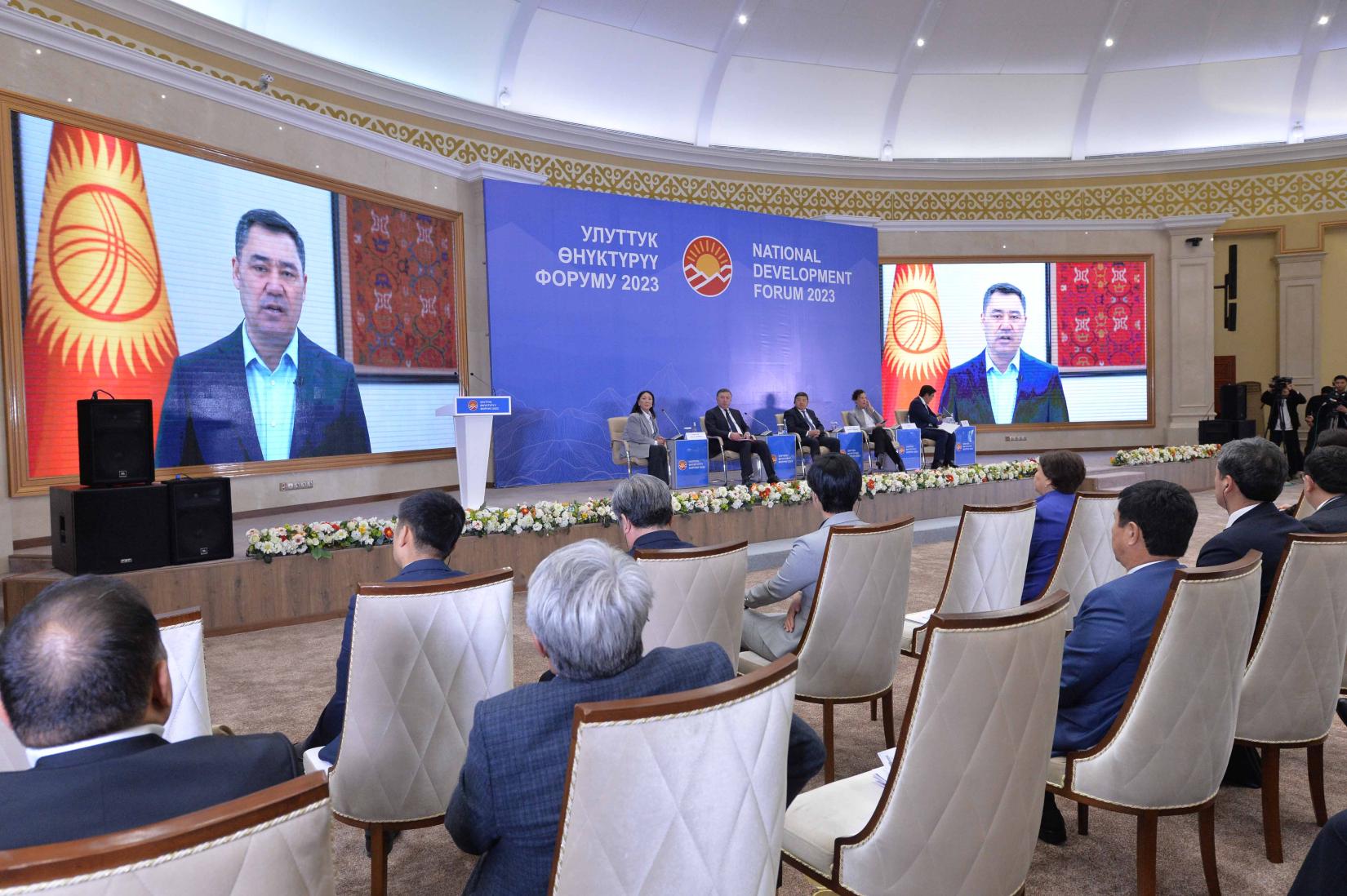
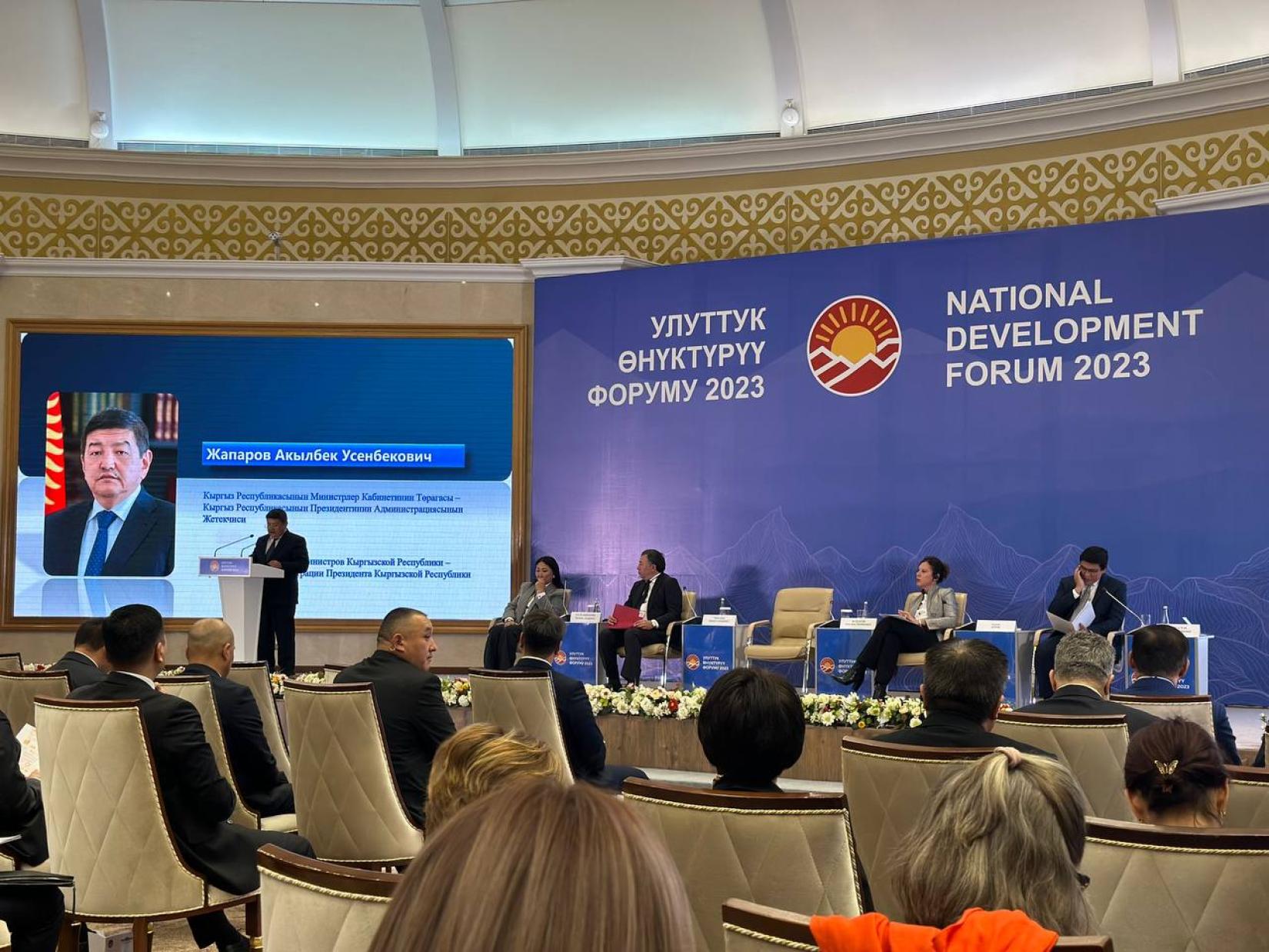
Distinguished guests,
We stand at a critical juncture in the fight against poverty. Despite significant progress over the years, the vision of a world free of poverty remains elusive.
Let us look at what poverty is:
Poverty is much more than the lack of income and resources to ensure sustainable livelihoods. Its manifestations include hunger and malnutrition, limited access to education and other basic services, social discrimination and exclusion including on the basis of gender or ethnicity as well as the lack of participation in decision-making. Various social groups bear the disproportionate burden of poverty.
A decade ago, the outlook appeared more optimistic, with a sustained reduction in global extreme poverty. However, the year 2020 brought about a sudden halt to this progress, as multiple crises, including the COVID-19 pandemic, climate shocks, conflicts, and rising food prices, resulted in three years of lost gains between 2020 and 2022. The global poverty rate has regrettably returned to pre-pandemic levels, with low-income countries being the hardest hit and yet to fully recover.
What does this mean for the people? It signifies that approximately 700 million people worldwide are struggling to survive on less than $2.15 per day, the international extreme poverty line. This grim statistic highlights that millions lack the means to meet their basic needs, with more than half of them being children.
Kyrgyzstan has not been spared of these global trends: Official statistics from 2022 reveal that more than 2.3 million people lived below the poverty line; extreme poverty has risen from 0.6 in 2018 to 6 percent in 2022, 7.3 percent of the population is at risk of falling into poverty at any time. Children are disproportionately impacted by poverty, with 40.3 percent of children aged 0-17 years - the equivalent of about 1.1 million individuals - affected. Kyrgyzstan, a labor donor country, relies significantly on income generated from activities outside its borders. Excluding this income, the poverty rate in the country reaches a staggering 43.3 percent, with Batken being the most vulnerable region, where poverty without remittances affects nearly 70 percent of the population.
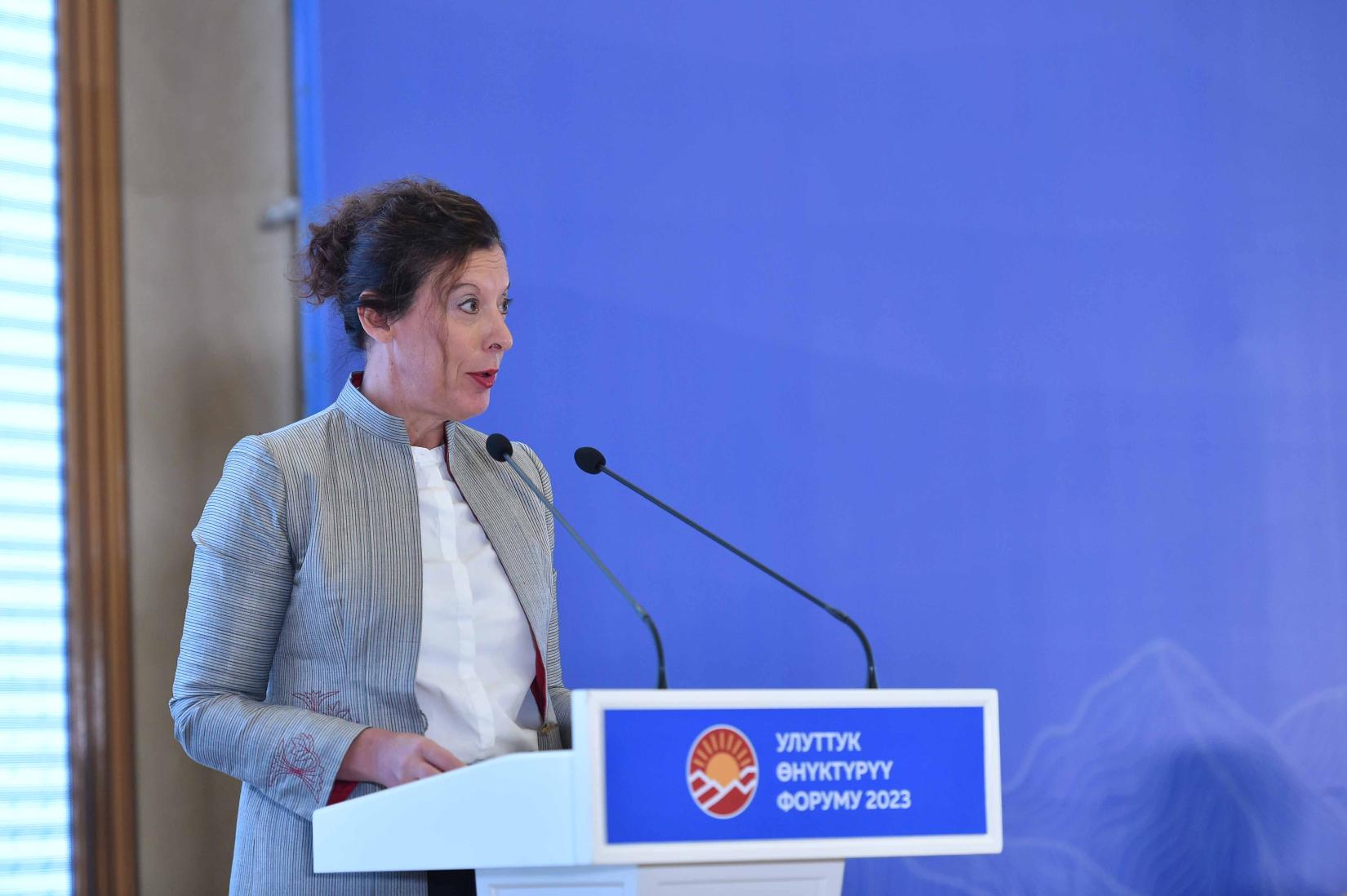
Ladies and Gentlemen,
Poverty is too often still defined as a lack of money, as much as development is too often still defined through GDP alone despite decades of efforts to change this notion. Individuals in poverty often face multiple disadvantages, from education to health, nutrition, access to clean water and electricity, to housing and employment.
Certain groups in society risk to be more affected by poverty and inequalities, including women and children, elderly, persons with disabilities, refugees and asylum seekers. Without a particular focus on the vulnerable groups, the promise of leaving no one behind cannot be fulfilled. In this context, let me stress the critical importance of gender equality for ending extreme poverty and promoting shared prosperity. A lot of work remains to be done in this regard. Only 27 percent of all entrepreneurs in Kyrgyzstan are women. The share of agricultural enterprises registered under women's names is less than 10%. Inequalities also persist in the average salary of women and men, where the average salary of women is only 75.1% of the average salary of men, to mention just a few points.
To design effective policies to poverty eradication, it is essential to acknowledge the multidimensional nature of poverty. Let us all commit to comprehensive and targeted measures to eliminate poverty in all its forms and dimensions, also utilizing the National Multidimensional Poverty Index as a tool for informed policy decisions.
Because of its complexity, effective poverty alleviation also requires coordinated, collaborative and intersectoral efforts both at the level of Government and with and in the society.
As the United Nations Deputy Secretary-General emphasized, a whole-of-society approach is needed that listens to the voices of those affected and fosters cooperation and partnership among all stakeholders, including governments, businesses, and civil society organizations.
Bilateral and international development partners including the United Nations (UN) and the IFIs play crucial roles in poverty reduction efforts around the world and in Kyrgyzstan, in manifold ways including financial aid, technical expertise, policy support, advocacy, data and research and capacity building. That support can become even more effective when coordinated and aligned behind national development priorities.
The 2030 Agenda for Sustainable Development is a commitment to leave no one behind and prioritize those who are furthest from progress. Achieving this ambitious agenda hinges on visionary policies that promote sustainable, inclusive, and equitable economic growth, full employment, decent work, social integration, declining inequality, rising productivity, and a favorable environment.
I wish all of us a productive and enlightening discussion today, one that contributes to leaving no one behind and fosters the sustainable development of Kyrgyzstan, with all partners working collaboratively to address the multi-dimensional challenges of poverty!
Thank you very much!
Кайрылууну жасаган
